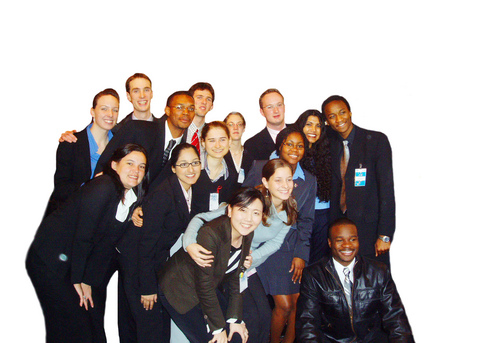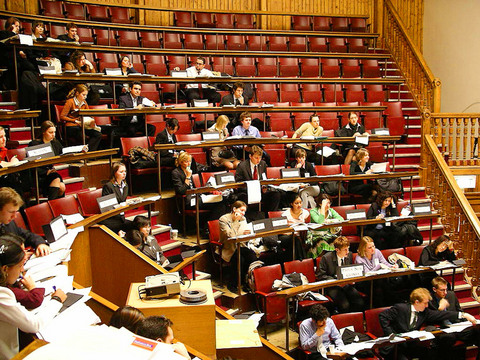In a recent editorial published in the Taipei Times, Philip Yang (楊永明), a professor in the department of political science at National Taiwan University (NTU) criticized Taiwan's media for paying too little attention to international events and called on television stations and print media to increase their international coverage and analysis. But if Taiwan's media and citizenry are all but ignoring what is happening off the island's shores, a group of students from NTU have over the past three years been increasing their knowledge of the world through a club known as the Model United Nations (MUN).
The main purpose of the club is to prepare students to participate in MUN conferences like the National MUN conference being held at NTU from Friday to Nov. 26. Open to all university students in Taiwan, the conference has already attracted 185 participants.
Like MUN conferences of its kind in other countries, NTUMUN is a simulation education activity modeled after the UN's General Assembly and focuses on all aspects of multilateral diplomacy. Students take on the roles of foreign diplomats and participate in a simulated session of an intergovernmental organization (IGO). The "delegates" are given a country to research and then take on the role of a diplomat, investigate important issues influencing their country, debate, deliberate, consult with delegates from other countries and finally develop solutions to world problems.

According to the United Nations Association of the United States of America, more than 90,000 students take part in over 400 model UN conferences in 48 countries throughout the globe every year. While some simulations are small ranging from classroom sizes of 20 students, the largest is the Model UN conference, which is held by Harvard University and generally attracts between 2,000 and 3,000 participants.
"Since we are not a member of the UN, this is the only chance for students to participate in this kind of conference," said Hsiao Yao (蕭瑤), a politics senior and NTUMUN secretary-general.
The NTUMUN shares the same ideals and goals of other organizations of its kind, the members of which must employ a variety of rhetorical skills and critical thinking to defend the policies advanced by their country.

PHOTO COURTESY OF NTUMUN
To attend a conference or simulation activity abroad, participants must first past an oral and written test that is created and administered by the NTUMUN club, of which there are currently about 60 members.
The written test covers a broad variety of international topics, rules and procedures of Model UN conferences and writing working papers or resolutions. The oral component tests the student's ability to communicate in English — the language used at the UN — by having them introduce a particular topic and engaging in teamwork.
As Yang points out, the unique aspect of NTUMUN is that it is administered by students for students. From the professional Web site to organizing conferences, the club is a volunteer organization that relies only on student's expertise to get things done.
The UN in Taiwan
The focus of this year's conference will be three UN committees — United Nations Development Program (UNDP), Disarmament and International Security Committee (DISEC) and the World Trade Organization (WTO). Each committee is given two topics to discuss and debate with the eventual goal of adopting and passing two resolutions by the majority of delegates. Before the conference begins, the chair of each committee chooses one to three delegates to represent each country.
Gary Mu (穆國維), an international relations major is chair of the DISEC committee and chose his topics based on how relevant they are to current affairs of which weapons of mass destruction (MWD) and terrorism are most prominent.
"It's related to our everyday world in the sense that security is more of a concern for Taiwan. My aim is to let the delegates focus on a security issue in a global aspect," he said. He also added that in light of recent events in North Korea, students should have a lot to talk about.
The committee chair ensures the committee discussions run smoothly, Mu said, though the delegates are responsible for negotiating their own resolutions.
"As chairs, we don't want to see an unproductive committee. If the delegates are not going in a productive direction, it's our purpose to move them forward. But it's not the chair's purpose to intervene," he said.
But Mu isn't too worried about delegates being at a loss for words on the topic of weapons of mass destruction.
"The [WMD] treaties — what we call high politics — usually involve a lot of vibrant debate. Each delegate from each country has their own interests — their core interests — because it's a security issue," he said.
Jason Liao (廖健鈞) agrees that all issues should be topical. The WTO committee chair and senior who majors in international business picked genetic modified organism (GNO) trade disputes as well as the Doha Round Trade disputes as his core topics because, "most countries take different positions on these issues."
Of the twenty countries chosen by Liao, half are developing and half are developed, allowing all delegates to gain a greater understanding of the different positions held by affluent and poor nations and how it affects their respective policies.
At the end of the conference, every committee votes for the three best delegates who have performed well diplomatically. Delegates are not pressured to make the UN successful because in reality the international body has been unable to resolve many issues in its half-century of existence. Therefore the process, not the product is emphasized and delegates begin to appreciate both the effectiveness and the limitations of the UN in today's world.
"For me, it's not about whether or not you got your resolution passed. The best delegates should be those people who involve themselves in negotiations and also do not create tensions and compromise [on] different interests and then form a resolution that can be accepted by other delegates," Mu said.
That's politics
Though organizers say the students are confident when participating in local MUN conferences, attending conferences abroad can be stressful for many participants because they have to think quickly and debate in English. Liao compares the students from NTU with their counterparts from Harvard and West Point. "We are at a disadvantage because delegates from those schools have the tendency to drift towards others from the same country and language," he said.
"Sometimes [our] delegates are ignored because they are not Westerners and it is often assumed that [we] cannot speak English," said Hsiao.
Another problem that delegates from Taiwan often encounter when participating in the international conferences is the obvious problem that they are not members of the UN and most international bodies. The most recent Harvard MUN conference held in Beijing highlights the problems they often face because Peking University, the host of the event, insisted that "National" be struck from the NTU's title.
"When we expressed our dissatisfaction to Harvard staff, they just shrugged their shoulders and said 'well that's politics,'" said Mu.
The real world
But Mu and the others take this kind of behavior in their stride versed, as they are in the minutiae of foreign affairs. What mystifies the NTUMUN is the lack of interest shown by the media, government and private corporations in their own country.
"The school and MOFA will sponsor this year's event. In the first two years we also received funding from the Taipei City Government but they cut our sponsorship this year," said Hsiao.
Because government and university funding are drying up, the club has turned to the private sector and NGO's to make up the difference. "We have contacted almost 50 foundations. We started searching for sponsors in July right up until now," said Hsiao, adding that "foundations such as Fubon Bank … have both been approached but they are only willing … to sponsor art."
With funding disappearing and sponsorship nowhere to be found, the organizers fear that only after three years of running the conference it may end due to a lack of cash.
Yang says there are two essential problems that the students from the NTUMUN face, the first of which is institutional because many government agencies don't have a policy for subsidizing these kinds of events and when they do it is only for a limited period of time.
"It's [also] a policy problem. They don't have this kind of vision and lack understanding of the importance as well as how to evaluate the importance of those activities," he said.
Ironically, the international community is taking the conference seriously but the domestic situation is quite different. But this is the kind of problem that UN member states encounter all the time, and judging by the intelligence and hard work of the conference organizers they will probably find sponsors to keep it going.

One of the biggest sore spots in Taiwan’s historical friendship with the US came in 1979 when US president Jimmy Carter broke off formal diplomatic relations with Taiwan’s Republic of China (ROC) government so that the US could establish relations with the People’s Republic of China (PRC). Taiwan’s derecognition came purely at China’s insistence, and the US took the deal. Retired American diplomat John Tkacik, who for almost decade surrounding that schism, from 1974 to 1982, worked in embassies in Taipei and Beijing and at the Taiwan Desk in Washington DC, recently argued in the Taipei Times that “President Carter’s derecognition

This year will go down in the history books. Taiwan faces enormous turmoil and uncertainty in the coming months. Which political parties are in a good position to handle big changes? All of the main parties are beset with challenges. Taking stock, this column examined the Taiwan People’s Party (TPP) (“Huang Kuo-chang’s choking the life out of the TPP,” May 28, page 12), the Democratic Progressive Party (DPP) (“Challenges amid choppy waters for the DPP,” June 14, page 12) and the Chinese Nationalist Party (KMT) (“KMT struggles to seize opportunities as ‘interesting times’ loom,” June 20, page 11). Times like these can

June 23 to June 29 After capturing the walled city of Hsinchu on June 22, 1895, the Japanese hoped to quickly push south and seize control of Taiwan’s entire west coast — but their advance was stalled for more than a month. Not only did local Hakka fighters continue to cause them headaches, resistance forces even attempted to retake the city three times. “We had planned to occupy Anping (Tainan) and Takao (Kaohsiung) as soon as possible, but ever since we took Hsinchu, nearby bandits proclaiming to be ‘righteous people’ (義民) have been destroying train tracks and electrical cables, and gathering in villages

Dr. Y. Tony Yang, Associate Dean of Health Policy and Population Science at George Washington University, argued last week in a piece for the Taipei Times about former president Ma Ying-jeou (馬英九) leading a student delegation to the People’s Republic of China (PRC) that, “The real question is not whether Ma’s visit helps or hurts Taiwan — it is why Taiwan lacks a sophisticated, multi-track approach to one of the most complex geopolitical relationships in the world” (“Ma’s Visit, DPP’s Blind Spot,” June 18, page 8). Yang contends that the Democratic Progressive Party (DPP) has a blind spot: “By treating any